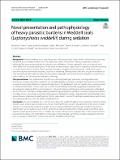Novel presentation and pathophysiology of heavy parasitic burdens in Weddell seals (Leptonychotes weddellii) during sedation
Author(s)
Shero, Michelle R.; Burek-Huntington, Kathy; McCorkell, Robert; Nadler, Steven A.; Rzucidlo, Caroline L.; Klink, Amy C.; Hindle, Allyson G.; Burns, Jennifer M.; Johnson, Shawn; ... Show more Show less
Download12917_2025_Article_4740.pdf (2.396Mb)
Publisher with Creative Commons License
Publisher with Creative Commons License
Creative Commons Attribution
Terms of use
Metadata
Show full item recordAbstract
Background Marine mammals act as sentinel species, with top predators’ overall health reflecting their ecosystem, integrated across multiple trophic levels. Yet apparently healthy wild animals may have significant subclinical pathology that goes undetected due to unknown medical histories. Marine mammals, particularly phocid seals, often suffer from heavy parasite burdens. While there are documented cases of severe respiratory infections resulting in complications during sedation, there have been no reports of gastrointestinal parasites contributing to poor outcomes during examinations requiring sedation or anesthesia. This report describes two unique presentations of high intestinal parasite loads that purportedly predisposed Weddell seals (Leptonychotes weddellii) to complications under sedation, and characterizes underlying pathology. Case presentation Two adult female Weddell seals exhibited prolonged apnea and vomiting while under intravenous sedation, that led to aspiration and mortality despite resuscitation attempts. Post-mortem examination revealed a severe Diphyllobothrium tapeworm impaction in the duodenum, with the parasitic mass causing a partial or complete obstruction. In both cases, the stomach was remarkably distended, suggesting the parasitic mass slowed gastric emptying. Both animals’ stomachs contained a high parasite burden with roundworms embedded into the mucosa. Histological analysis identified underlying pathological conditions that were likely parasite related, including chronic pneumonia associated with lungworm infestations, reactive, depleted and fibrosed lymph nodes, granulomatous lymphadenitis and hepatitis. Further examination in one of the animals revealed severe gastritis and necrotizing duodenitis at the site of the cestode infection. Conclusions To our knowledge, this is the first description of a significant gastrointestinal parasitic impaction being linked to acute distress during sedation in a marine mammal. We provide an in-situ depiction of the severe cestode infection. It is noteworthy that both animals in this case study exhibited histopathology consistent with chronic inflammation across multiple organ systems. Whether animals were sufficiently immunocompromised that rapid parasite growth became unchecked, or whether the parasite infestation led to dysfunction in other organs remains unresolved. We discuss the potential for premedication with prokinetic agents that increase esophageal sphincter tone to mitigate complications in future late-summer Weddell seal handlings.
Date issued
2025-04-29Department
Woods Hole Oceanographic Institution. Department of Applied Ocean Physics and Engineering.Journal
BMC Veterinary Research
Publisher
BioMed Central
Citation
Shero, M.R., Burek-Huntington, K., McCorkell, R. et al. Novel presentation and pathophysiology of heavy parasitic burdens in Weddell seals (Leptonychotes weddellii) during sedation. BMC Vet Res 21, 300 (2025).
Version: Final published version